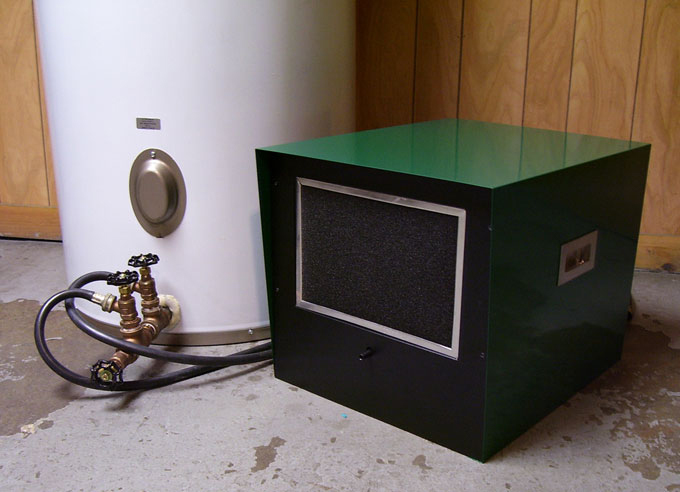Blog Post
Heat Pump Water Heaters

There's a revolution underway with electric water heating. It could be just as significant as the shift from top-loaders to horizontal-axis front-loaders that we've seen in the laundry appliance industry.
For years, electric water heaters were simply insulated tanks with a couple of electric-resistance elements that heated the water. These have worked pretty well, and with the highest-insulation products, the "Energy Factor" (a standardized measure of efficiency that factors in losses through the insulated tank) of the best products get pretty close to 1.0 (100% efficient).
Within the past few months, at least three electric water heaters have been introduced that double this efficiency. These are heat pump water heaters. Rheem offers the 50-gallon HP-50; the German company Stiebel Eltron introduced in the U.S. the 80-gallon Accelera 300; and North Road Technologies offers the "retrofit" Geyser product that connects to a conventional electric or gas water heater.
These new products join a couple of retrofit heat pump water heaters already on the market (the E-Tech line, now made by A.O. Smith, and the AirTap made by AirGenerate). And next month, GE is set to introduce its own heat pump water heater, which the company calls a "Hybrid" water heater.
How does a heat pump water heater work?
Instead of using electricity directly to heat water, a heat pump water heater uses electricity to move heat from one place to another--in this case, from the surrounding air where the unit is located into the water. This is done by circulating a special "refrigerant" fluid that can be alternately evaporated into a gas and condensed into a liquid by changing its pressure.
SUPPORT INDEPENDENT SUSTAINABILITY REPORTING
BuildingGreen relies on our premium members, not on advertisers. Help make our work possible.
See membership options »Surrounding air is drawn into the heat pump where the heat in that air vaporizes refrigerant in the "evaporator," releasing cooler air into the room. The refrigerant vapor is then pumped through a "compressor" where it condenses back into liquid form and releases its stored heat into the water.
All this sounds pretty complicated (and, well, it is), but this "refrigerant cycle" is well understood and widely used in both refrigerators and air conditioners.
More about heat pump water heaters
The benefit of a heat pump water heater is that you get at least twice as much hot water from each kilowatt-hour of electricity consumed as you get from a standard electric water heater. The Energy Factors of these units range from 2.0 to 2.5--meaning that they are, effectively, 200% to 250% efficient at converting electricity into heat. With new Energy Star standards for water heaters now in effect, among electric water heaters only heat-pump models make the grade. This will significantly spur interest in the technology.
A disadvantage of heat pump water heaters is that they rob heat from the room where they are located. In the winter, this means that they can increase heating costs. If you heat with electricity, this eliminates much of the benefit of the heat pump water heater during the winter months, but if you heat with less expensive gas, oil, or wood, you should still realize significant savings. The units are often installed in "semi-conditioned" space, such as a basement or garage, but they should not be put in a space that can drop below about 40 degrees.
While extracting heat from the room is a drawback in winter, it's an advantage in the summer. During warm months, heat pump water heaters provide free air conditioning and dehumidification--because they cool air as it is circulated through the heat pump. For this reason, heat pump water heaters are likely to find the most receptive buyers in warmer climates.
A condensate drain line has to be installed to remove water that condenses out of the air as heat is extracted and the air is cooled. This can complicate installations, especially in basements of existing houses.
Be aware that the fan in a heat pump water heater (which draws air through the unit) makes some noise. The sound levels of the products on the market range from 49 to 64 decibels (dB), which is on the same order of magnitude as a refrigerator.
Finally, heat pump water heaters are expensive. Suggested retail prices range from $700 for the retrofit AirTap model (which still requires a storage water heater) to $3,500 for the largest, integral-storage Stiebel Eltron (which offers the highest efficiency of any of the products). The Rheem HP-50 has a typical contractor price of $1,300 to $1,500, and the Stiebel Eltron $2,500. The need for installing a condensate line will further increase the installation cost. More on heat-pump water heaters can be found in the October 2009 issue of Environmental Building News (log-in required).
I invite you to share your comments on this blog. You can also follow my musings on Twitter.
Published October 12, 2009 Permalink Citation
(2009, October 12). Heat Pump Water Heaters. Retrieved from https://www.buildinggreen.com/blog/heat-pump-water-heaters



Add new comment
To post a comment, you need to register for a BuildingGreen Basic membership (free) or login to your existing profile.